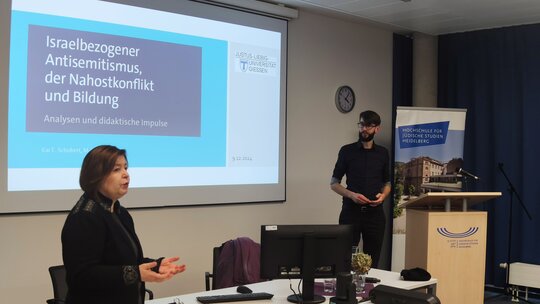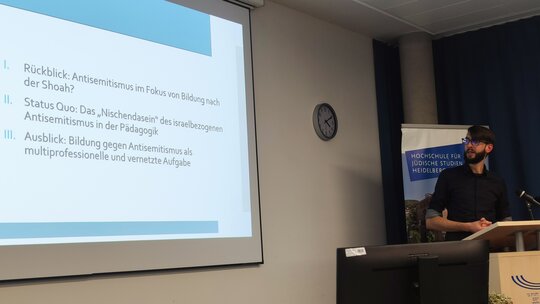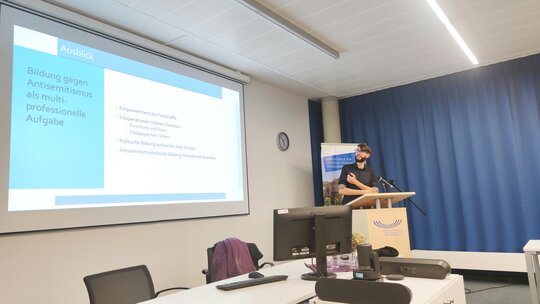This event would have deserved a much larger audience than gathered here on a Monday afternoon at the Heidelberg University of Jewish Studies. Just under 15 people talked to Kai Schubert, one of the authors, about the book "Israel-related anti-Semitism, the Middle East conflict and education". Dr. Havva Engin, Professor at the Heidelberg University of Teacher Education and Head of the Heidelberg Centre for Migration Research and Transcultural Education (Hei-MaT), moderated the discussion. Schubert is a doctoral student at the University of Giessen in the field of didactics of social sciences, a freelance political educator and a research assistant at the Research Institute for Public and Private Security at the Berlin School of Economics and Law.
The production of the book started before October 7, 2023, Schubert makes clear, because both before and after this date, new forms of anti-Semitism, such as Israel-related anti-Semitism, have hardly been dealt with and have had frighteningly little impact on education. In addition, there are hardly any research projects on this topic that have already produced usable results.
The publication deals with the school and extracurricular debate on the topic of anti-Semitism and the Middle East conflict. According to Schubert, anti-Semitism is usually only discussed or dealt with in connection with National Socialism, although Israel-related anti-Semitism is much older and should be given far more importance.
In addition, waves of thematic debate can be recognized. Whether it was the Six-Day War, the failure of the peace process or the outbreak of the second Intifada - hostility towards Israel and a new anti-Semitism were discussed in the USA and Europe. In Germany, civil society actors began to drive this discussion forward. They came up with project ideas, distributed handouts in youth clubs and were supported by democracy-promoting programs. In other words, it was primarily extracurricular educators who began to promote these issues around 20 years ago.
As welcome as the initiatives are, their evaluation possibilities are inadequate, as there is hardly any empirical research into extracurricular education, says the doctoral student. It is therefore not possible to scientifically record which concepts should be continued, which were unsuccessful or even produced the opposite results.
In fact, the pedagogical treatment and the resulting teaching still lead a niche existence today. "The hyper-complex tangle of discourse involving Israel, the Middle East conflict, anti-Semitism, Jews, Germany and National Socialism obviously needs to be untangled first," says Schubert. From the perspective of political education, there is the topic of the Middle East conflict, which can be analyzed politically. What are its origins? Which actors are carrying out the conflict with which means and for which interests? What international connections are there?"
The second topic that has to do with this is the question: "How is this topic discussed and received in Germany? What actions are derived from the perception of this conflict?". According to Schubert, this is about the national political culture in Germany, keyword: raison d'état, Germany as a post-national socialist society.
Both could be part of the lesson, separately, but in relation to each other. "Discussing the topic of anti-Semitism does not mean that the topic of Judaism is finished". Unfortunately, however, the Middle East conflict would be treated objectively and without any emotion, which would do justice neither to the topic nor to the recipients.
According to Schubert, current anti-Semitism does not appear in school textbooks at all. "Anti-Semitism in Germany, which is supposedly legitimized by arguments against the state or the policies of Israel, does not exist in this form." Instead, the book presents innovative educational concepts and contributions from educational practice.
In the following discussion with the audience, further deficits in the current educational approach to Israel-related anti-Semitism become clear: Meet-a-Jew cannot be carried out across the board, nor should it be the task and responsibility of Jewish fellow citizens to protect the country from anti-Semitism or to educate people about it. Especially since, although it is a sensible educational concern to learn about Judaism as part of Germany, anti-Semitism as a projection and consumed perception has little or nothing to do with it.
In conclusion, Professor Engin believes that it is crucial to pick up the children's breadth on the topic of anti-Semitism from their own living environments in order to be able to take them with them more effectively. She also mentions the problem of the sovereignty of interpretation of the term anti-Semitism, as this is itself being fought over.
Another shortcoming is the fact that the subject is taught outside of the subject area, meaning that teachers without specialist knowledge are usually overwhelmed by this topic anyway. "Especially when it comes to such existentially important topics, we need to intervene, otherwise our society will soon blow up in our faces," states Engin. "This is also where the diversity of migration comes into play, which we have to take into account. We have to learn to deal with these existential issues differently and, in the case of the blatant anti-Semitism that children bring with them unthinkingly from the Islamist corner, ask whether this is brought along from family contexts or where this narrative comes from. And then comes the work, the small-scale work against conspiracy theories and crude thought constructs for a multi-perspective opening. We have to see in which subjects this can be exemplified from the context without having to be forced."





![[Übersetzen nach: English] [Übersetzen nach: English]](/fileadmin/_processed_/d/8/csm_6_9eb40e317e.jpg)
